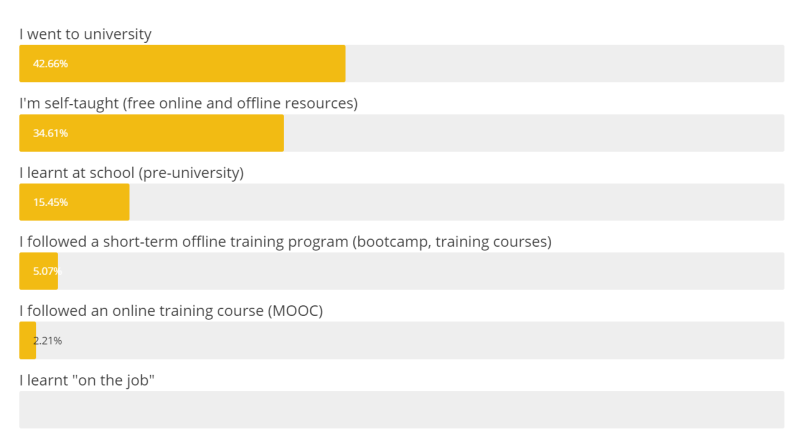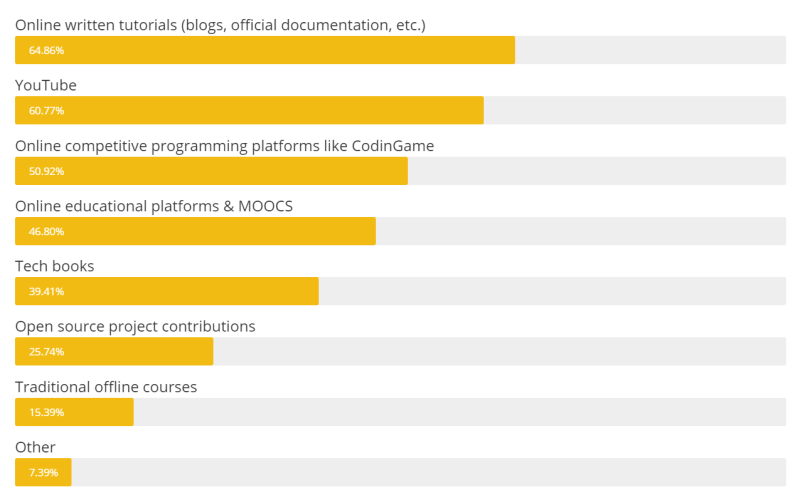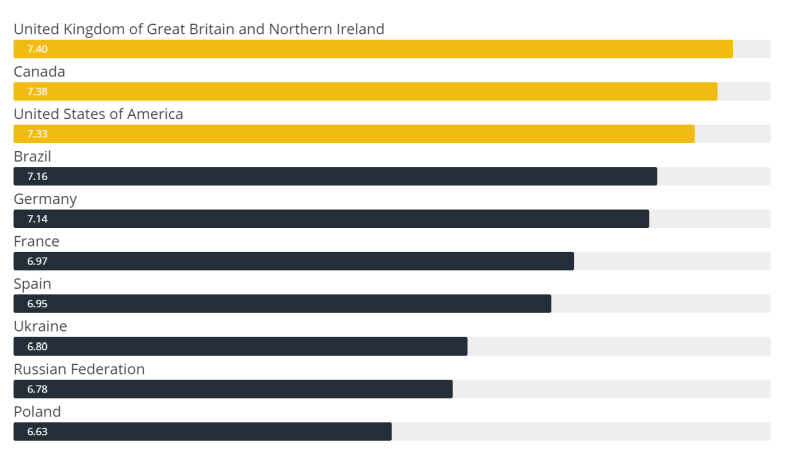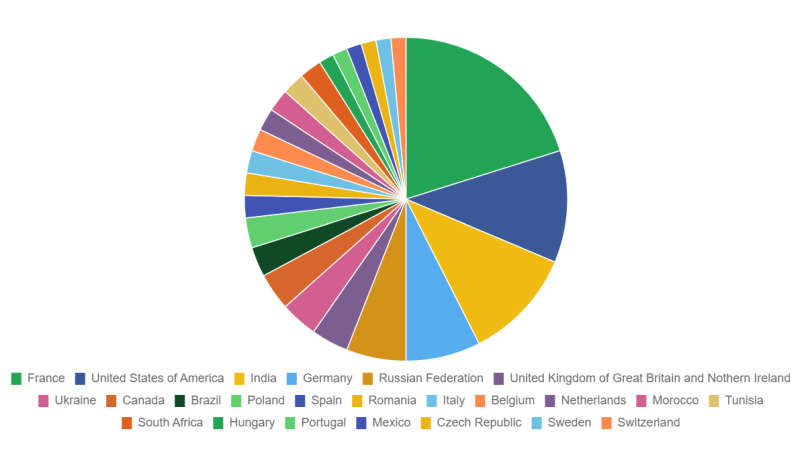| What Makes Developers Tick |
| Written by Nikos Vaggalis | |||
| Friday, 31 January 2020 | |||
|
CodinGame has explored this issue with a survey of its dev community. Among key insights, its new report reveals which country is the best to work in.
CodinGame is a challenge-based training platform where programmers can improve their coding skills with fun exercises and is an easy-to-use platform for tech hiring companies. It claims a community of 1.7 million people worldwide and has over 500 international clients. For the third year running, CodinGame profiled its developer community about their education & qualifications, what they would like to learn more about in 2020, their most loved programming languages versus their most dreaded, their level of fulfillment in coding and much more. The data for the 2020 Report was collected via Survey Monkey from October to December 2019. Responses came from over 20,000 code enthusiasts in 120 countries. Here we consider some of the key takeaways from the survey. The question HOW DO DEVELOPERS LEARN TO CODE? gets the ball rolling. 43% answered at University with a further 15% at school, 34% learnt by themselves, 5% from a bootcamp or training course and just 2% from MOOCs.
It comes as a surprise that most people still prefer the brick and mortar institutions to get their education from in this age of the highly publicized MOOCs, bootcamps and alternative platforms of education. This supports the idea that MOOCs have a high dropout rate because being inexpensive, students have nothing to lose when dropping out. Bootcamps on the other hand haven't attracted many takers, probably due to the cost and the uncertainty whether they count as job-worthy qualifications. However, in CODING AND KEEPING UP TO SCRATCH MOOCs are used by 46% of respondents, meaning that despite not being preferred as the primary source, are used as a secondary source for keeping up abreast of the newest technologies. This chart also highlights yet another tendency to stick to traditional methods, showing that text is still the primary format preferred as Online written tutorials (blogs, official documentation, etc.) tops the list. If you also add books, then the percentage in favor of text is even higher. YouTube, however, comes as a strong second. Half of respondents select CodinGame and similar platforms as a means of improving their skills.
LEARNING IS DOING, RIGHT?, or as I would rephrase it "Do you have a life after coding?". The survey reveals that 1 in 3 developers say they code for more than an hour a day outside of work or school. Do you know of any other profession that is also considered a hobby? It must be something special. This question reflects the hours spent working on Open Source, side projects, just having fun or learning in general. A very interesting question is WHAT ARE DEVELOPERS EXCITED ABOUT LEARNING THIS YEAR? Machine Learning tops the list, being heralded as the most promising career-proof sector although extremely hyped at the same time. Then comes Game Development, not surprising since the game scene even surpasses the movie industry in earnings. Of course, Web and Mobile Development fill the top 5, preferred due to their ubiquity. Programming wise, functional programming occupies spot # 5 reflecting the notion that OOP is outdated. Developing on the Blockchain,yet another promising technology, is on the rise as well. The question CAN YOU GUESS THE BEST-KNOWN FRAMEWORKS IN 2020? confirms that Javascript in its incarnations of Node, nominated by 36% of respondents, and React (24%) is still king, although .NetCore comes in a strong third position with 23%. Javascript's success is also reflected in WHICH PROGRAMMING LANGUAGES DO DEVELOPERS KNOW BEST? The report states: Javascript, Java, Python and C++ are the best-known programming languages: over half of our respondents answered that they know how to code in these languages In fact JavaScript is known by almost two-thirds (65%). And the old horse Java does almost as well (63%). Check How is Java Doing? for more. DEVELOPERS' MOST-LOVED PROGRAMMING LANGUAGES Special mention for Python, in top position for the third year in a row. The language has truly captured developers’ hearts In a strange contradiction, when it comes to DEVELOPERS' MOST-DREADED PROGRAMMING LANGUAGES, where PHP tops the list with 25%, Java (24%) and Javascript (22%) are placed at 2 and 3 respectively! How do you explain that? The report suggests: These two programming languages seem to divide developers: they either hate em’ or they love em’. The languages are cited both as two of the most-loved and most-hated languages. As far as PHP goes there is no such division: There’s one language, however, that everyone agrees on – and that’s PHP. PHP is recognized, yet again, as developers’ most-dreaded language. DEVELOPERS, WORK & HAPPINESS When asked, on a scale of 0 to 10, how much they enjoy their job, 66.4% of respondents answered between 7 and 10. I think that this captures the essence of how developers regard their daily routine. I know of people who drag themselves to work seeing what they do as massive chores. These people are not in love with what they do. In contrast devs love what they do. Coding is a very rewarding activity. You go each day to work without feeling anxious about what you're going to encounter. Instead you embrace the unknown because that unknown is going to demand the creativity of coding. As such, some say that coding is a form of art, not science. Even in the rare case when I get bored, I don't have to kill time on Facebook or watching videos of cats. Instead I read the latest tech news, tutorials and source codes, gazillions of them, that way keeping myself occupied, entertained and educated at the same time. EDUCATION AND PROFESSIONAL FULFILLMENT IN CODING and QUALIFICATIONS AND PROFESSIONAL FULFILLMENT IN CODING. In fact, developers are happy at work regardless of whether or not they learned to code in a formal setting and that: You can become a fulfilled programmer no matter your educational background However, coding is just one part of what developers do; there's also other activities that go with software engineering,such as meetings, presentations, writing documentation, testing, administrative tasks, etc, which might not be as enjoyable as coding. So I reached out to CodingGame for a clarification: We asked developers, on a scale of 0 to 10, how much they enjoyed their job, and the average score was 7/10. This question was aimed at understanding the overall level of fulfillment developers have at work. Without surprise, developers are professionals who have a high job satisfaction. This is tightly linked to a mix of factors such as salary range, flexibility, work-life balance, and the fact that for many developers, coding is a hobby, which makes being at work a lot more fun. For a more in depth breakdown of how the devs' time is allocated, have a look at Activestate's survey in What Eats Your Programming Time. WHERE ARE DEVELOPERS HAPPIEST AT WORK? To create the ranking of where developers are happiest, we crossed their place of work with a question asking them how much they enjoy their current job. The UK comes out on top because developers working in the UK gave high scores when answering the question "On a scale of 0 to 10, do you enjoy your current job (0 = I hate my job; 10 = I adore my job!)". The amount of respondents in each country has little impact on the ranking, as we worked with averages. I don't know how Brexit is going to affect the job market and the conditions of working in the UK. It may potentially affecting this ranking.
Reaching the Demographics section,which is the last one in the report, the stats once more verify that the industry is male-dominated with the finding: close to 90% of our respondents identify as male. However, the report also notes: the proportion of women who took part in our survey has progressed from 6% (2 years ago) to 8.7% (last year) to 11.5% this year. DEVELOPERS ACROSS THE GLOBE Over 21,000 developers from all over the globe took part in our survey. The main represented countries are: France, The United States, India, Germany, Russia,United Kingdom, Ukraine, Canada, Brazil,Poland and Spain.
To clarify,the Demographics are not based on the respondent's nationality but on where they are currently working. IT is certainly a prosperous market to be in as 50% of respondents are employed full time; 31% are students looking forward to a job, and just 8% are unemployed. In terms of company size: 32.3% of respondents work in a company with over 1000 employees. Companies with 50-249 employees come next, representing 21.5% of respondents. And in terms of role, the most frequent was "Full-stack developer" (24.6%). Becoming a developer certainly looks like a wise career move. Based on my interpretation of the results, the way to have a great chance of getting a job, keeping it and being happy at it, would be:
More InformationCODINGAME 2020 DEVELOPER SURVEY REPORT Related ArticlesCodinGame Contest For Fun and Employment What Eats Your Programming Time To be informed about new articles on I Programmer, sign up for our weekly newsletter, subscribe to the RSS feed and follow us on Twitter, Facebook or Linkedin.
Comments
or email your comment to: comments@i-programmer.info |
|||
| Last Updated ( Friday, 31 January 2020 ) |






